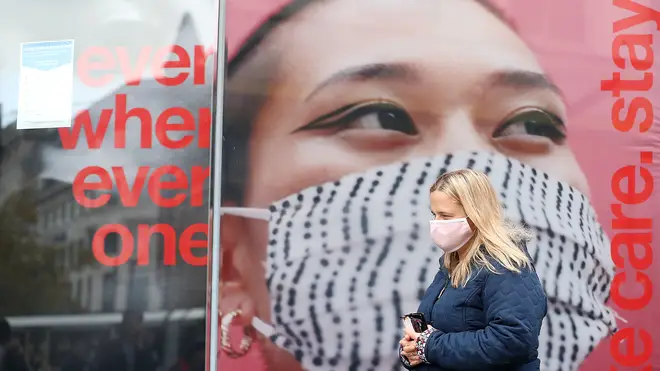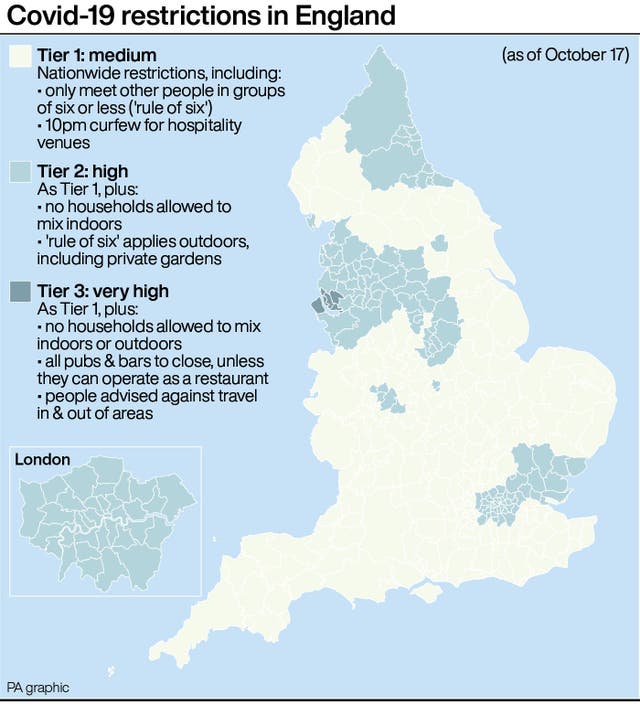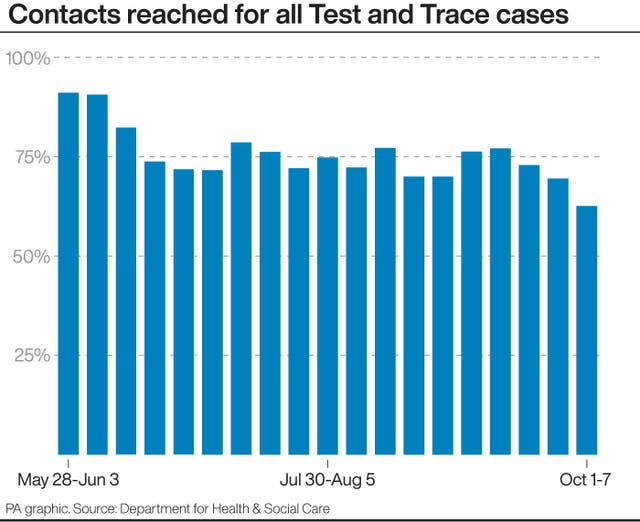
Richard Spurr 1am - 4am
15 October 2020, 19:04

London will move into Tier 2 from Saturday, with a ban on households mixing indoors.
Half the population of England will be under stricter lockdown measures from Saturday despite concerns in Whitehall the measures may be “frankly useless” in controlling the spread of coronavirus.
London will move into Tier 2 of the alert system from Saturday, banning people from separate households mixing indoors – including in pubs and restaurants.
Essex, Elmbridge, Barrow-in-Furness, York, North East Derbyshire, Erewash and Chesterfield will also move into the second tier of measures.
But a bitter political row between local politicians and the Government has so far prevented Greater Manchester being moved into Tier 3 – the most severe restrictions.
Health Secretary Matt Hancock’s announcement of the new restrictions means more than half of England’s population will be under Tier 2 “high” or Tier 3 “very high” restrictions.
With Boris Johnson under continued pressure to impose a short, nationwide circuit-breaker lockdown, senior figures advising the Government have expressed concern about the impact the existing measures will have.
One senior source said if a circuit-breaker had been introduced earlier as cases were just starting to go up, it could have knocked the numbers down to levels seen in the summer.
Another influential figure said many existing measures are “frankly useless” and will not be enough in places where cases are rising fast.
Meanwhile, Greater Manchester Mayor Andy Burnham claimed England’s deputy chief medical officer Jonathan Van-Tam has told him the only way to bring the virus back under control is a national lockdown.
Mr Burnham is strenuously resisting attempts to place Greater Manchester in Tier 3, saying what is proposed goes far beyond just closing pubs and bars and is not guaranteed to bring the outbreak under control.
“The deputy chief medical officer also told us last night that the only certain thing to work is a national lockdown,” Mr Burnham said.
“But the Government told us this morning it is unwilling to do that because of the damage it will do to the national economy.
“And yet that is what they want to impose on the North West.”
Mr Hancock responded with an appeal to local government leaders to set aside political differences and work with the Government to control the virus.
“I call upon local leaders to set aside this party politics and to work with us to put in place the measures that are needed in Greater Manchester, across the North West, so that we can deal with this virus and support people through it,” he said.
“This is a time for people to come together so that we can control this virus.”
The changes to the tier system – which only came into effect on Wednesday – that will go ahead this weekend were announced by Mr Hancock in the Commons.
He told MPs: “Let us be under no illusions about the danger posed by this virus.
“Coronavirus is deadly and it is now spreading exponentially in the UK.”
The latest figures show 18,980 new coronavirus cases and 138 deaths had been reported as of Thursday.
Liverpool City Region, comprising 1.6 million people, remains the only area currently in Tier 3.
But the changes announced by Mr Hancock on Thursday mean a further 26.7 million people will be covered by the Tier 2 restrictions.
The Health Secretary said: “We must take firm and balanced decisions to keep this virus under control.
“This is the only way to protect lives and livelihoods – and we must act now.
“Delayed action means more deaths from Covid, it means more non-Covid deaths and it means more economic pain later.”

London Mayor Sadiq Khan told City Hall the move to Tier 2 is based on “expert public health and scientific advice about what is necessary to save lives in the capital”, but he stressed he is pushing for extra support from the Government.
“Nobody wants to see more restrictions – but this is deemed to be necessary in order to protect Londoners’ lives by myself, London council leaders and by ministers,” he said.
Tory MP Nickie Aiken, who represents the Cities of London and Westminster, said: “Whilst I appreciate the public health crisis we find ourselves in, I remain deeply concerned about the impact further lockdown will have on the capital’s hospitality, leisure and retail businesses.”
The ban on households mixing indoors could be devastating for more than 5,000 pubs and almost 8,500 restaurants in the newly-designated Tier 2 regions, which will see business suffer but will not be eligible for Government support available to premises which have been ordered to close.
As the latest restrictions were announced, the troubled NHS Test and Trace system recorded its worst ever week for contact tracing.

Data shows 62.6% of close contacts of people who tested positive for Covid-19 in England were reached through the system in the week ending October 7.
This is the lowest weekly percentage since Test and Trace began, and is down from 69.5% the previous week.
Meanwhile:
– Northern Ireland is braced for the toughest controls in the UK so far with pubs and restaurants set to close for four weeks from Friday and schools facing a two-week shutdown.
– Welsh Secretary Simon Hart has said a ban proposed by the Welsh Government on people entering the country from UK coronavirus hotspots “risks stirring division and confusion”.
– Nicola Sturgeon said a new tiered system in Scotland will “strengthen our resilience to live with this virus” when it replaces temporary measures due to end on October 25.
The Westminster Government has come under fire from former homelessness adviser Dame Louise Casey about the support on offer for workers whose employers are ordered to close under lockdown rules.
The Job Support Scheme, which launches on November 1 and lasts for six months, will involve the Government paying two-thirds of each employee’s salary – up to a maximum of £2,100 a month – if their employer is legally required to close their premises because of restrictions.
Dame Louise told the BBC: “It’s like you’re saying to people, ‘You can only afford two-thirds of your rent, you can only afford two-thirds of the food that you need to put on the table’.”
But Chancellor Rishi Sunak said the welfare system would top up the wages of the lowest-paid to 90% of their usual earnings.